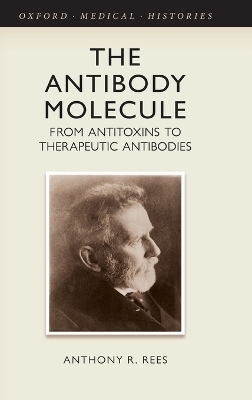
The Antibody Molecule
Oxford University Press (Verlag)
978-0-19-964657-9 (ISBN)
The Antibody Molecule follows the extraordinary journey of the medics and scientists who shaped the course of medical advances in the field of immunology. One of the oldest of the medical sciences, immunology has a history that has seen chemists, physicists and biologists alike seeking to unravel the most complex system in the human body outside the brain. This book charts its intriguing history, from the genetic basis of antibody diversity, through the understanding of the mechanism by which the immune system's first line of defence works, to breakthroughs in crystallography and the exploitation of immunoglobulins as therapeutic platforms to treat cancer, inflammation and allergy.
Tracing the developments in immunology in chronological order, Professor Anthony R. Rees presents the historical contexts of the periods in rich detail, bringing them to life with quotes and illustrations. This fascinating book examines the literature of the time, turning points, and controversies. A must read for immunologists and life scientists, as well as historians of science and medicine.
Anthony Rees is currently Principle at Rees Consulting AB, Uppsala, Sweden. He was lecturer in Molecular Biophysics and Student of Christ Church from 1980 to 1990 at the University of Oxford. From 1990-1997 he was Professor and Head of the School of Biology and Biochemistry, University of Bath where he is an Emeritus Professor and holds an Honorary Doctor of Science. In 1989 he was a scientific cofounder with Graham Richards of Oxford Molecular, which became one of the earliest UK biotechnology companies to be listed on the London Stock Exchange. He has been visiting Professor at the Universities of Montpellier and Lund, scientific director of the French company Synt:em, CEO of the Swedish company MIP Technologies and Chairman of the Board of the antibody technology company, F-star. He is a member of the American Association for the History of Science and has published more than 120 scientific papers, a number of books and is an inventor on more than 30 patents.
1. Antibody pre-history: The emergence of empirical immunology ; 2. Pre-molecular immunology: The dawn of mechanism ; 3. Structural chemistry: Locks, keys and colloids ; 4. The foundations of antibody-antigen recognition emerge ; 5. The cellular reformation ; 6. The molecular path unfolds ; 7. Uncovering the origins of antibody diversity ; 8. Immunoglobulin constant regions ; 9. Effector functions of constant regions ; 10. Transmission and catabolism of IgG ; 11. The structural context of antibody diversity ; 12. Monoclonal antibodies and the mechanisms of hypermutation ; 13. Antibody structure prediction and development of humanization strategies ; 14. Antibody engineering: Improving on natural immunity ; 15. Therapeutic antibodies: Case study 1: Prevention of respiratory syncytial virus illness ; 16. Therapeutic antibodies: Case study 2: Targeting breast cancer ; 17. Antibodies: The therapeutic future
| Reihe/Serie | Oxford Medical Histories |
|---|---|
| Verlagsort | Oxford |
| Sprache | englisch |
| Maße | 167 x 242 mm |
| Gewicht | 718 g |
| Themenwelt | Studium ► Querschnittsbereiche ► Geschichte / Ethik der Medizin |
| Studium ► Querschnittsbereiche ► Infektiologie / Immunologie | |
| ISBN-10 | 0-19-964657-0 / 0199646570 |
| ISBN-13 | 978-0-19-964657-9 / 9780199646579 |
| Zustand | Neuware |
| Haben Sie eine Frage zum Produkt? |
aus dem Bereich


